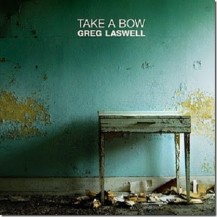Greg Laswell’s “Take A Bow”
“‘Take A Bow’ is a total growth chart of Laswell’s music.” -BY
Beth Yeckley
8
out of 10
Greg Laswell
Take A Bow
May 4, 2010
Vanguard Records
Chances are that most of you are not familiar with the name Greg Laswell, or any of his music. Often famed as the man of the hour for TV show soundtracks, his voice delivers an unwavering ease and understanding that requires little else in common with the singer, other than having loved.
It’s safe to say that most of Laswell’s career has displayed a propensity for melancholy music: stories crafted in an attempt to understand the casualties endured in love and the end of it. While the pool of singer/songwriters is endlessly deep, many of them float a repetitive and often times pathetic expression of sadness… the songs are sadder in their craft than the tragedy they speak of. But Laswell is continuously able to hold my attention—just when I assumed that his third album, Take A Bow, was going to be a continuance of his last two, he proved me wrong. Take A Bow shines with an undertone of survival, relief, and a peace from coming to terms. More than floundering in defeat and the loss of a lover or a loved one, Laswell’s songs build cityscapes upon which love can rise and fall, and we can all relate, wherever we are.
Take A Bow is a total growth chart of Laswell’s music. He offers various vocal tones across the album, showcasing his talent for reaching into songs in all depths and manners. I’d say that “surprising” is the best way to describe the album—between the upbeat songs and the unexpected joy found even in the sadness of the lyrics, to allowing himself an angry song (“Come Clean”), and to the feeling of finality that comes with hearing him sing “Take A Bow,” this album is bound to strike a chord with you, in one way or another.
Songs like “My Fight (For You)” and “Come Clean” are dark, haunting, and even lash out in what feels like a freeing expression of the frustration that can come from a relationship. “Take Everything” shows a sarcastic side while “You, Now” offers a symphonic feel and although it’s a song about missing someone, it bursts through with a great hope in seeing that person soon. “Off I Go” is could easily be one of the saddest songs on the album, but displays a unique upside to its content. The song’s about taking a chance and probably not making it, not reaching your goal, but there is something liberating about going for it anyway.
I’ve found that Laswell’s music carries a very intuitive quality, wherein you can hear what he’s saying and how he feels through the instrumentation, and you just understand it. It’s clear that he’s done some serious growing, especially from his first album (which was written after his divorce), and that he has developed a clarity in his life and music, although he’s not shy to throw himself back into the mess. “Take A Bow” is totally an admittance of defeat, but knowing that there’s nothing else you could have done. It translates as a maturity that only exists when you’ve fought for something, lost it, and accepted that it’s over—that place where remembering things is no longer about being in them. This song also comes across really simple in its musical qualities, but it’s very well composed.
